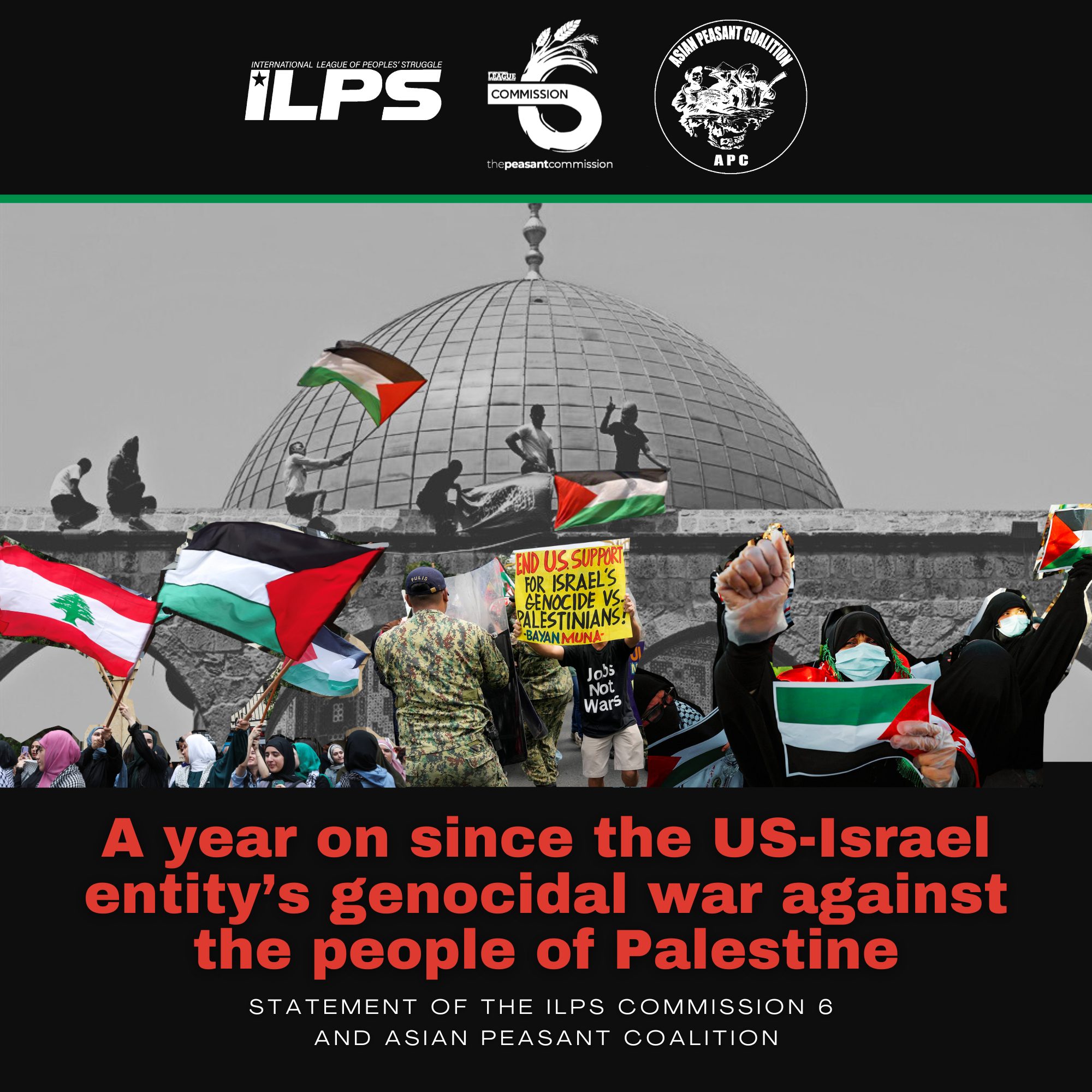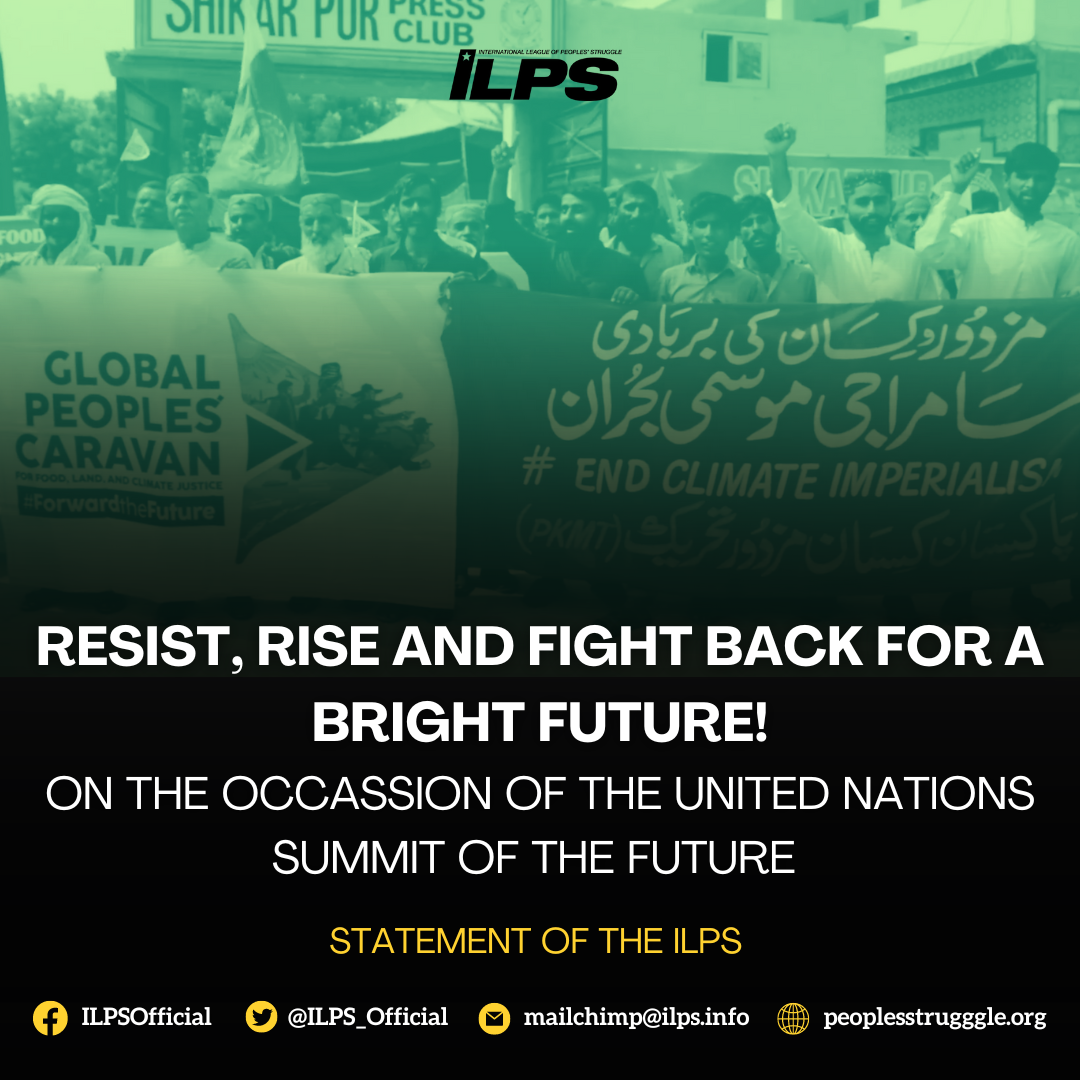Last December 1, COP28 @Dubai: What’s in store for the peoples and masses?, an online discussion organized by the Peoples Rising for Climate Justice (PRCJ), shed light on the 2023 United Nations Climate Change Conference in Dubai, more commonly known as COP28.
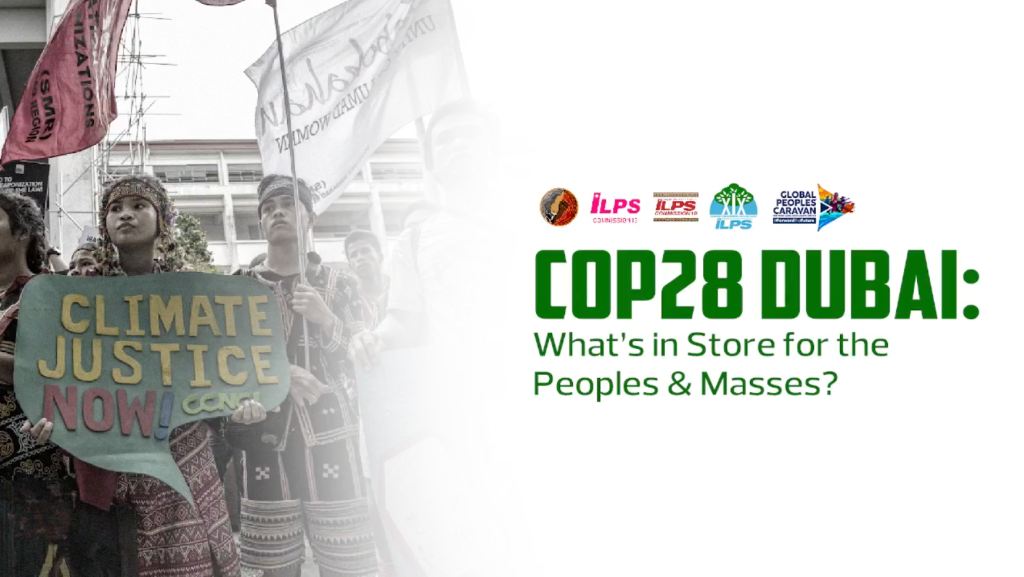
The important discussion featured Celestine AkpoBari of IPMSDL, an indigenous leader from Ogoniland, Nigeria. AkpoBari dissected the climate crisis impact on the Ogoni community, delving into its root causes and emphasizing the resilient and necessary force of mass mobilization and international solidarity in addressing this pressing global issue.
Death of life, death of water, death of the air
Celestine AkpoBari is the National Coordinator of the Ogoni Solidarity Forum and a stalwart defender of human rights and the environment, active especially in the Niger Delta region. With a commitment spanning over two decades, AkpoBari’s poignant reflection on COP28 resonates: “Another COP is here. Another season where people’s hopes are raised, and dashed, and smashed.”
AkpoBari discussed the history of the Ogoni people’s struggle against the destruction of oil conglomerates. The indigenous leader traced the struggle back to Nigeria’s 1958 oil discovery. As three decades passed, the toll of extraction emerged—a landscape of impoverishment marked by polluted land and vanishing resources, sparking a non-violent movement spearheaded by Ken Saro-Wiwa.
Tragically, the Ogoni campaign was considered very dangerous as “it was touching on the heartbeat of the Nigerian economy which is oil.” Saro-Wiwa and 8 other Ogoni leaders paid the ultimate price as they were executed in 1995, while 2,000 young Ogoni men were massacred under the military occupation.
AkpoBari laments that nothing has changed with the advent of COP28, which only marks another three decades of enduring violence from both oil giants and the State hurled at their protests.
“You can imagine the number of people that have been impoverished because they can no longer fish and farm. You can imagine the number of people that have died because they inhale poisonous hydrocarbons in the air. You can imagine the number of people that have died of malnutrition because they don’t have food to eat. You can imagine the number of people that have died because they drink polluted water, because there are no alternatives in the absence of a government. You can imagine the number of people that have died because of lung-related diseases, because as they inhale poisonous emissions, the lungs and the heart become weak. You can imagine the number of barriers that we carry on in Ogoni.”
The indigenous leader also discussed the United Nations Environment Program (UNEP) environmental audit that was submitted in 2011. Its findings indicate that it will take the Nigerian government 30 years to clean up Ogoni, and yet the new government has already expressed plans to exploit more oil.
“It will be madness that you claim that you are mopping the floor, and you turn on the tap. It’s only a madman that can do that,” says AkpoBari.
For the indigenous leader, it is only sensible that the Nigerian government should instead be conducting environmental assessments in neighboring Niger Delta communities. Upholding Ogoni’s cleanliness hinges on ensuring cleanliness in surrounding areas, recognizing the interconnectedness of water flow and the risk of ongoing pollution.
AkpoBari also urges the government to abrogate the Land Use Act: “It’s a criminal law that takes away every land that belongs to indigenous people. The government owns all the land. They don’t need to take permission from you; they don’t need your consent. They don’t need to consult you if they want to take your land for oil production or anything. They just come. So the issue of land grabbing is very high as long as the Land Use Act exists.”
The indigenous leader also underscored the need to prioritize implementing adaptation measures as a critical focus: “These corporations, their attention is on mitigation: Let us prevent [the climate crisis] from coming to us. But there are those of us who are already living with the negative consequences of oil production or climate change. They don’t want to talk about adaptative measures. They don’t want to support measures we have to put in place for adaptation, only mitigation. I think attention needs to shift toward that side.”
Finally, during the open forum, AkpoBari responded to an audience member’s question surrounding the ways in which we must campaign for climate justice given that the COP28 is ineffective and colludes with imperialists and polluters. For the indigenous leader, despite the hardships, the Ogoni people have been able to make progress because of the support they have received from people around the world. He emphasizes the power of international solidarity and calls on people to continue to support the Ogoni people and other communities that are fighting against the destruction of oil production.
“Everything about oil production is death of the environment—death of life, death of water, death of the air. There’s nothing good about it.”
Peasants and workers for climate justice
Kurniawan Wawan Sabar of the Institute for National and Democracy Studies (INDIES) was also a speaker in the engaging webinar.
Sabar, a rural people’s researcher and activist based in Indonesia, highlighted the role of imperialist corporations and big landlords as the primary culprits of the climate crisis. The exploitative and oppressive nature of the system has unjustly burdened billions of working-class people, peasants, fisherfolk, women, and national minorities, serving the insatiable greed of global monopoly capitalists and reinforcing the dominance of the United States.
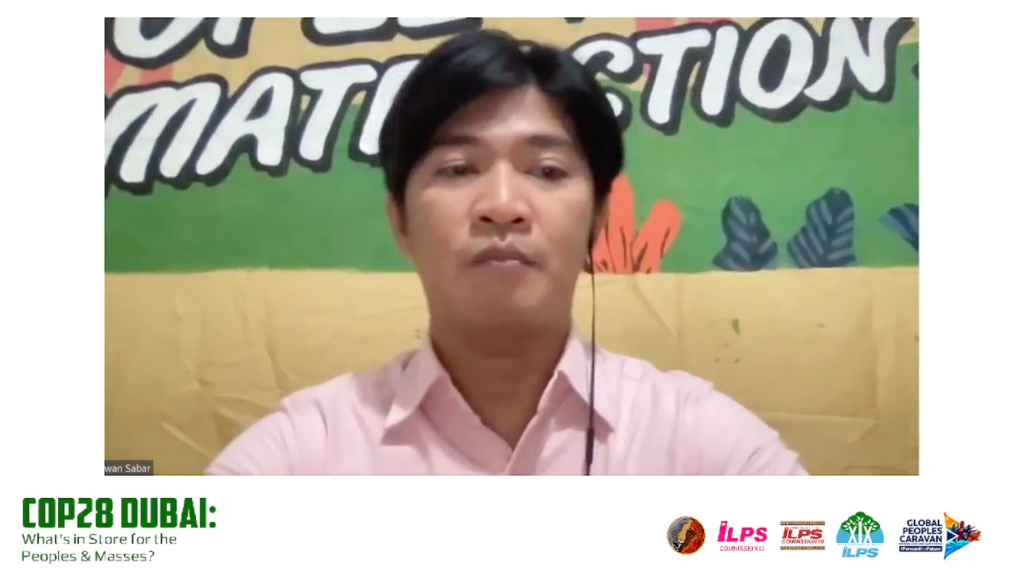
Regarding COP28, Sabar’s perspective centers on the worldwide call for a just transition and substantial funding that genuinely serves people’s needs and “not just a luxurious dinner that must be paid by the people themselves, or a new business field for export capital finance imperialists in form of debt and investment in the name of climate solution.”
The researcher-activist also delved into Indonesia’s semi-colonial and semi-feudal system, pointing out how these structures nullify the government’s green promises. Deforestation and land-grabbing persist as the country pursues to be the world’s largest producer and exporter of crude palm oil.
Another speaker was Peter Murphy of the International League of People’s Struggle (ILPS). Murphy is a unionist and long-time human rights worker. His discussion focused on the issues of the workers and indigenous peoples in Australia.
According to Murphy, “The targets [of the present government] still will not contribute to the world keeping warming to 1.5 or close to 1.5 degrees centigrade by 2050 or anytime. So we have still big challenges in Australia and there are plenty of criticisms from the climate and environment movements.”
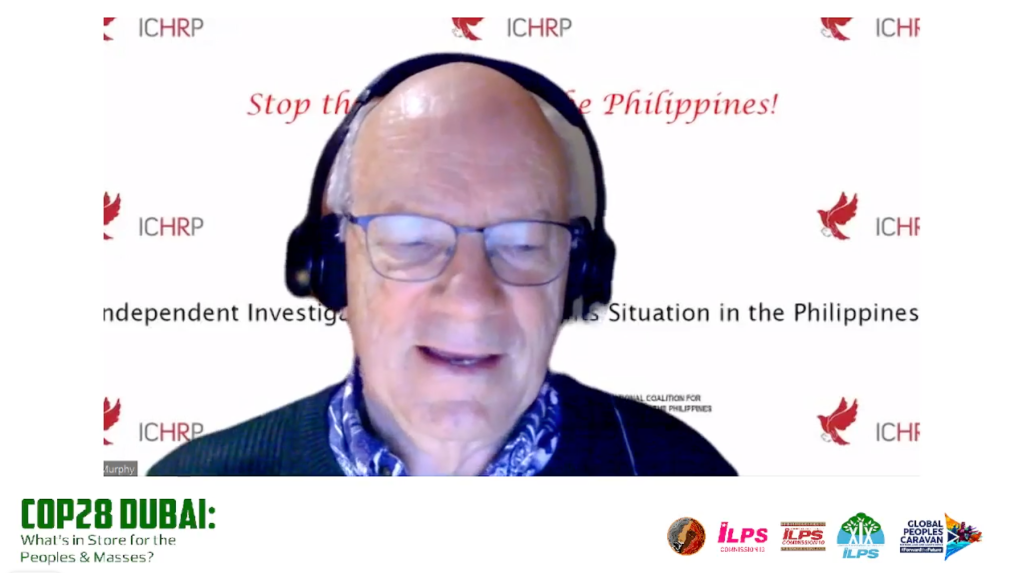
The esteemed peace advocate reported on the workers’ complex concerns: stopping the climate crisis’ impact on communities, including severe flooding and bushfires, while also addressing the risks to jobs and communities dependent on carbon-intensive sectors like coal mining and the steel industry.
As for the indigenous peoples, Murphy talked about the persistent exposure to fossil fuel mining risks, and he also drew attention to the growing threat posed by the mining boom for metals essential to renewable energy, such as lithium, copper, and nickel. He further reported the ongoing efforts of indigenous communities leading a campaign against the Adani company’s mine in Queensland, notorious for its exploitation of both indigenous groups and the environment.
Monopoly capital as the root of climate crisis
The opening remarks of the event were delivered by the chairperson of the ILPS, Len Cooper, who criticized COP28 and previous conferences’ emission targets as too little and too pathetic which are not even being delivered as well.
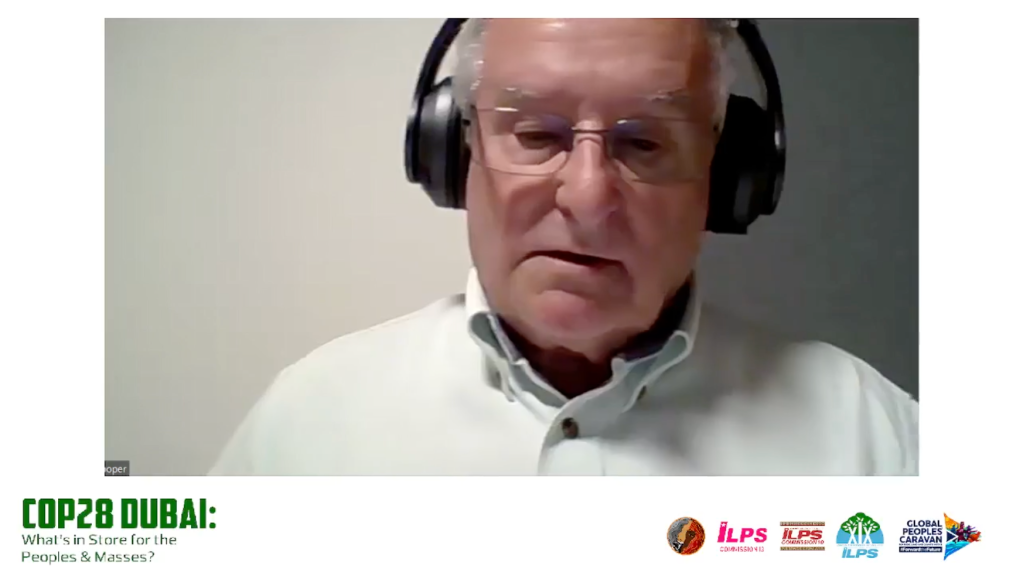
Cooper stressed the need for mass mobilizations: “Only in this way will we do what science correctly requires to be done to solve the climate crisis. At the same time, we need to further expose the need to defeat the imperialist governance of the world and replace it with governance by the united front of working people, peasants, and other toilers. Instead of domination by the profit motive and greed, we will then be governed by the people’s needs and the common good.”
For the closing remarks, Enteng Bautista from the ILPS Environment Commission echoed Cooper’s sentiments and synthesized the points raised by the other speakers.
Bautista believes that climate agreements are profit-making schemes that further enable the plunder of our resources and degradation of our ecological system through false climate solutions.
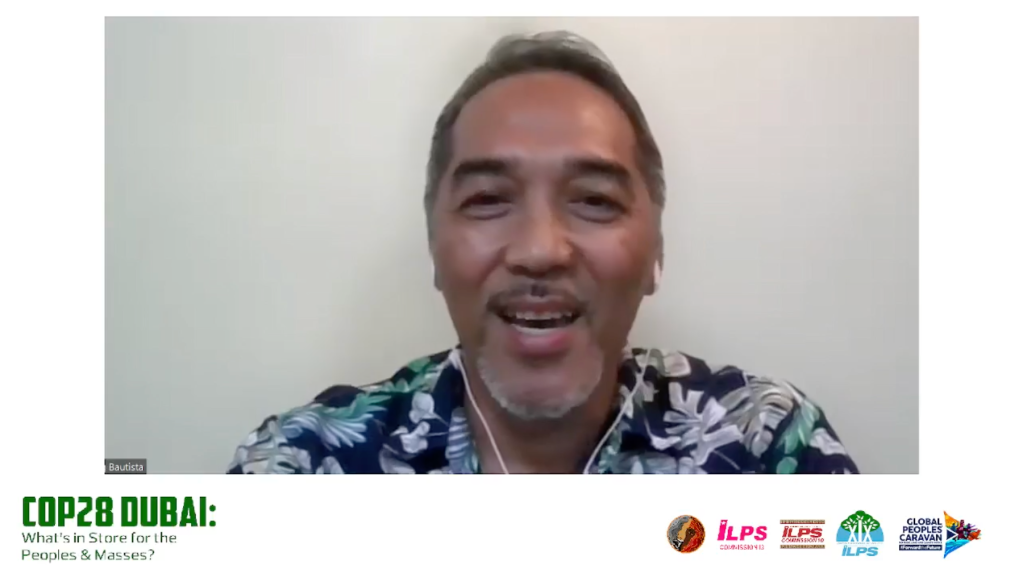
Nevertheless, he views COP28 as, “an opportunity for us to expose the duplicity and greediness of imperialist countries in addressing the climate crisis. Inside and outside COP is a classroom to educate our allies, friends, and the public that the climate talks dominated by imperialism and big corporations will not and cannot address the climate crisis.”
Bautista added, “We must raise their consciousness that the root cause of the climate crisis is the continuing domination of the global monopoly capital, as pointed out by our speakers. If we do our work effectively, this will result in more organizations joining our networks.”
The webinar, hosted by Xian Guevarra from Youth Advocates for Climate Action Philippines (YACAP), closed with an invitation to the live audience to participate in the Global Day of Action for Climate Justice on December 9.
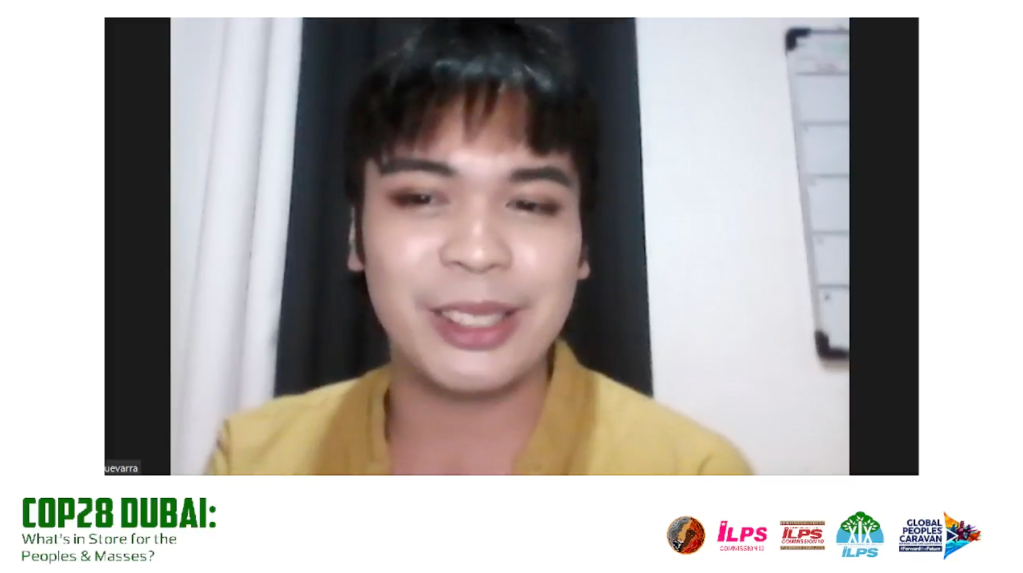
Other organizers were the Global People’s Caravan for Food, Land, and Climate Justice, and the different commissions of ILPS Commission 10, 13, and 19.#
Reference:
ILPS Commission 10 Secretariat
[email protected]

